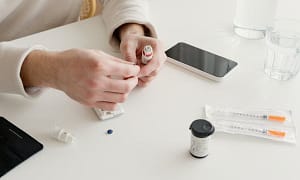
Autism spectrum disorder (ASD) is a complex condition, and even doctors are not yet sure what causes it. But they do believe genes have a huge role in determining whether a child is born with this disorder. There is still no treatment for the disorder.
However, we know babies can be born with birth defects in cases where their mothers were exposed to certain rays or chemicals during pregnancy. But it’s still beyond the reach of doctors to say confidently—during the pregnancy stage itself—whether a baby will be autistic.
Thus, it’s not possible for doctors to prevent babies from having autism, but they can definitely help during pregnancy to increase the chances of having a healthy baby. Before reaching that stage, parents should know a few things:
- Changes can happen during conception, pregnancy, and delivery, which can increase the risk of autism among children genetically prone to the disorder.
- Differences in the brains of autistic children can start appearing as early as the second trimester of pregnancy.
- Although a definite cause of ASD is not yet known, it’s believed that it develops from a combination, or interaction, of genetic and environmental factors.
- While bringing about genetic changes is beyond our reach, it’s very much possible to control certain environmental factors, like exposure to chemicals or adopting lifestyle changes, to lower the risk of autism.
Here are some factors that can help decrease the risk of autism during pregnancy:
- Increase your iron intake.
The risk of autism is five times higher in children born to iron-deficient mothers, says a 2014 study in the American Journal of Epidemiology. Iron is vital to the brain development of the fetus, and therefore, its deficiency can definitely cause some disorders. Iron is also vital to the development of a child’s nervous system, particularly during the pregnancy stage. That’s why pregnant ladies should take an iron-rich diet or iron-fortified supplement to minimize the dangers of autism in the newborn.
- Reduce your exposure to air pollution.
Pregnant women who are consistently exposed to air pollution are more likely to deliver babies with autism. A study by the Harvard School of Public Health established how the risk doubled when pregnant women were exposed to high levels of pollution. Obviously, exposure to air pollution is something that is very much under control, and pregnant ladies can stay indoors as much as possible during those crucial phases to minimize the risk of delivering a baby with autism.
- Avoid gaining weight.
There is a link between excess weight gain during pregnancy and autism, as suggested by the November 2013 issue of Pediatrics from the University of Utah. In fact, a child’s risk of autism is likely to be associated with their mother’s pre-pregnancy BMI (body mass index) and weight gain during pregnancy. With excess body fat, there will always be changes to a woman’s hormone levels, or excess fat can lead to inflammation that may affect fetal brain development.
- Keep your blood sugar level under control.
Expecting mothers with gestational diabetes are at greater risk of having a child with autism, says the study in the Journal of the American Medical Association (JAMA). Health experts say that a baby’s brain development is affected in utero when he or she is exposed to high blood sugar levels. This can also increase the risk of other developmental disorders. So, pregnant women should always try to keep their blood sugar level under control to minimize the dangers of having children with autism.
- Stay away from certain medications.
Certain medications taken during pregnancy can increase the risk of autism among babies. Two types of medications in particular—the use of anti-depressants and medication for treating epilepsy—are linked to heightening the risk of autism in newborns. It’s therefore important for pregnant women to keep in touch with their doctor and assess the pros and cons of the medications they are taking. This can help keep the risk of developmental disorders at low levels.
Clearly, prevention seems to be the only available treatment for autism that pregnant women can take and ensure low risks of the disorder in the newborn. If you’re pregnant, consult the doctor, discuss health concerns, and then follow the routine and precautions set forth to minimize the risk of autism in newborns.






